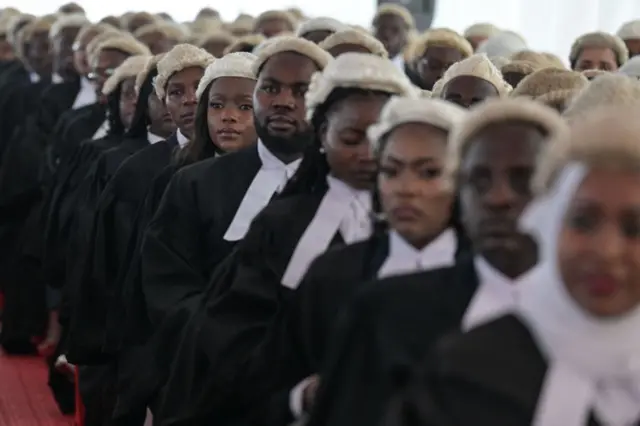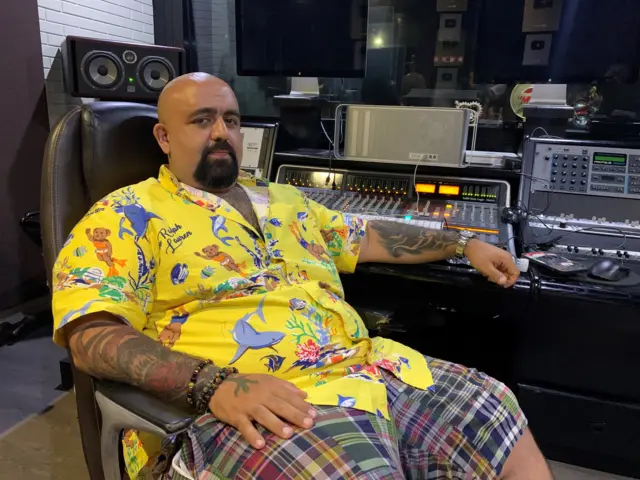Sierra Leone lifts curfew after prison breakoutpublished at 08:04 GMT 27 November 2023
President Julius Maada Bio says most of the leaders behind the attack are detained and calm restored.
Read MorePresident Julius Maada Bio says most of the leaders behind the attack are detained and calm restored.
Read MoreFor the latest updates, go to bbc.com/africalive
At least 100 are abducted over an unpaid "tax" the gunmen had imposed on villagers, residents say.
Read MoreYoung science writer of the year award-winner delves into the environmental challenges of cocoa farming
Read MorePresident Andry Rajoelina's win follows an election boycott by the opposition over credibility concerns.
Read MoreKhtek, one of Morocco's biggest rappers, talks to the BBC about sexism and mental illness.
Read MoreSouth Africa withdraws its bid to host the Women's World Cup in 2027 to focus on an improved bid for the 2031 tournament.
Read MoreIt is hoped that joining the East African Community will boost economic growth after years of war.
Read MoreThe Paralympian has been serving a 13-year sentence for murdering girlfriend Reeva Steenkamp.
Read MoreHibiscus Rising stands near where Mr Oluwale died in Leeds city centre.
Read MorePromoter Eddie Hearn has held talks over an Anthony Joshua fight in Africa which could "revisit" 1974's Rumble in the Jungle.
Read MoreHuman rights groups say more than 300 people were killed in opposition protests in 2022.
Read MoreClemence Mtenga should have graduated from university this week - instead his body is being flown home.
Read MoreLiberia manager Ansu Keita on how death threats from fans forced him to miss a 2026 World Cup qualifier.
Read MoreForeign troops are helping Mozambique tackle a six-year Islamist insurgency in the north.
Read MoreThe former Paralympian is serving over 13 years for murdering his girlfriend Reeva Steenkamp in 2013.
Read MoreThe group was returning home after meeting the First Lady in Nairobi when they were swept away.
Read MoreWe're back on Monday
That's it for now from the BBC Africa Live team. We'll be back next week.
Until then, there will be an automated feed. Or you can find the latest updates on the BBC News website, or listen to our Focus on Africa podcast.
A reminder of our wise words of the day:
Quote MessageKindness killed the partridge"
A Chewa proverb sent by Missy Mercy-Elsie Kazembe in Malawi.
Click here to send us your African proverbs.
And we leave you with this picture of a group of lawyers at their graduation ceremony in the Kenyan capital, Nairobi:
 Image source, AFP
Image source, AFP DJ Edu
DJ Edu
Presenter of This Is Africa on BBC World Service
 Image source, Don Bigg
Image source, Don BiggTaoufik Hazeb, known as Don Bigg, Bigg da Don or just Bigg, is one of Morocco’s most influential rappers - but he only got into hip-hop because: “I didn’t have a beautiful voice, so the choice was made.”
His latest hit is a collaboration between Nigerian singer-songwriter Teni and Hamid El Kasri, a master musician of Gnawa - a deeply hypnotic trance music that originated in Morocco’s enslaved communities.
Son of a Slave addresses Morocco’s history of slavery in a powerful and uplifting way.
It's taken Bigg a long time to confront the issue - even though for 20 years he built his reputation on being outspoken on controversial matters including politics, corruption, police brutality and domestic abuse.
Quote MessageI didn’t have the guts to talk about the subject [of slavery] because I didn’t want to just talk about something that’s not my culture.”
But then he realised that slavery was part of his own family’s history - his own grandfather is descended from enslaved people.
Don Bigg started out back in 2004 and became a big star in 2006.
He’s credited as pioneering Morocco’s rap movement. He knew in 1989 - when he was six years old - that he wanted to get into music. He was watching a Michael Jackson concert on TV.
“I didn’t understand a word, but I’m just feeling the vibe of his singing.
“When the crowd yelled at the end of the song, I got goosebumps - and I just had this feeling that this is what I want to do.”
Bigg began rapping in English, but soon realised that rapping in Darija, Morrocan Arabic, was the way to connect with the people.
He has collaborated with many of the younger generation of Moroccan rappers, including Dizzy Dros, Dragonov, Khtek and El Grande Toto.
Bigg believes that Moroccan rap is entering a new era.
Rappers in Morocco are heard all over the world, celebrated in the mainstream and even get the support of the king.
Quote MessageI'm really proud to see my country as it is right now. We had this dream back in the day.”
He says that Moroccan rap is also freeing itself from the influence of US and European rap as artists turn towards the rest of Africa for collaborations.
“I think people are starting to understand that Africa is the future - because it’s there that you can find a lot of different cultures.”
And you can certainly hear those different vibes in Don Bigg’s collaboration with Teni.
 Dorcas Wangira
Dorcas Wangira
BBC Africa health correspondent, Nairobi
Results from the world’s first double-blind clinical trial to find a treatment for fungal mycetoma, a chronic disabling disease, have shown that a new oral treatment, fosravoconazole, is safe, patient-friendly and effective.
Mycetoma, also known as Madura Foot or Nabat in Arabic, is one of the world’s most-neglected diseases.
The drug was tested in Sudan which, along with Mexico, reports some of the highest number of cases globally.
Mycetoma is caused by a fungus. Infection begins most often in the foot, after a cut allows the fungus to enter from the soil or animal dung.
It infects people who often walk barefoot.
The disease eats away at the flesh and is very difficult to treat.
If caught early enough there is a drug that can already be used but a patient has to take up to four pills a day for an entire year.
Too often, amputation to treat the infected foot is the only option.
According to trial results, the fosravoconazole treatment is cheaper and has fewer side effects than the current drug. Plus a patient will only need to take two pills a week.
The next step is for the drug to be registered for general use in Sudan. But the war is having devastating consequences and patients do not have access to the treatments they desperately need.